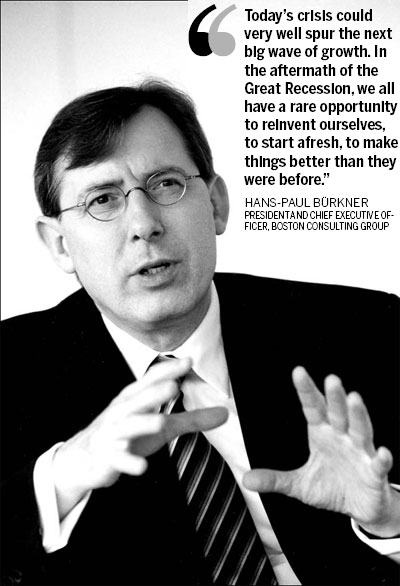World Business
BCG's Bürkner sees scope for opportunities ahead
By YANG NING (China Daily)
Updated: 2010-07-19 11:17
 |
Large Medium Small |

Financier and businessman calls for 'strategic optimism' in the economy
BEIJING - "Life is like a box of chocolates: You never know what you are going to get."
It's the most famous line from the international box office hit Forrest Gump and in a world of economic uncertainties, hits the nail on the head.
The past three years have dashed expectations to the ground. In 2007, the projected four-year growth rate for global gross domestic product (GDP) was comfortably above 4 percent. The actual annual rate fell to -0.9 percent in 2009 and the global economy is expected to achieve only slow growth over the next few years.
Although economies are still struggling to escape the shadow of 2008 financial crisis, Hans-Paul Bürkner, president and chief executive officer of the Boston Consulting Group (BCG), is calling on global leaders to have both an obligation and an imperative to move forward - with what he calls strategic optimism - to seek and to create growth, value, and opportunity for their companies and countries.
"The Great Recession leaves us with lots of challenges, not least the cleaning up of balance sheets, the aftermath of the real estate bubble in many countries and the need for governments to reduce first budget deficits and then overall debt levels. We should be clear-eyed about these challenges and their implications, but we should also recognize that the world today is primed for change and filled with opportunities," Bürkner told China Business Weekly.
"The fundamental drivers of growth are stronger than they have been at any point in human history. These include the increasing number of highly educated and capable people in the world, the breathtaking speed of technological breakthroughs, globalization, the inclusion of 'the next billion' customers into the world economy, and relative political stability," he continued.
Having an optimistic attitude is much, but turning optimism into action is more.
According to Bürkner, for countries with bloated bureaucracies, aging populations and rising healthcare and pension costs, it will require the radical restructuring of government programs, raising the retirement age, opening labor markets and investing heavily in education. Greece, for example, would probably never have implemented its austerity program without the impetus of its debt crisis. The undertaking will be a painful process but, in a best-case scenario, Greece's move will help return the country's people to a path of progress and prosperity.
For companies, it means making major changes that address the deep structural problems plaguing many industries. For instance, pharmaceutical companies are not developing the kind of breakthrough drugs they need to replace the blockbusters that are losing patent protection; automotive manufacturers are still producing too many cars and, in North America, too many of the wrong kind of cars - oversized gas guzzlers; and media companies are struggling to persuade consumers to pay for news, music, and videos in the age of the Internet.
"Today's crisis could very well spur the next big wave of growth. In the aftermath of the Great Recession, we all have a rare opportunity to reinvent ourselves, to start afresh, to make things better than they were before," he said.
As always, it is easier said than done. Based on his 29 years of consulting experiences with BCG, Bürkner provides some specific steps for active leaders to help their organizations return to strong growth trajectories.
First, confront reality. Be frank about your company's current performance and determine where it stands in terms of competitiveness. Second, develop new business models by piloting low-cost approaches; accelerate the introduction of new products and services and redesign processes by investing in research and development. Third, embrace globalization and use fast-growing emerging markets not only as a supply base but also as additional consumer markets. Last, but not least, play an active role in the consolidation of one's industry through divestments and through mergers and acquisitions.
"Essentially, leaders of companies and countries have to mobilize their people for continuous change, to embrace change as an opportunity despite all the risks," he said.
| ||||
A recent BCG 100 New Global Challengers Report found that in just two years, from 2006 to 2008, the number of companies based in four BRIC countries on the FT Global 500 list more than quadrupled, from 15 to 62.
"The challenger companies from the emerging markets are no longer relying solely on their cost advantages; many of them are actually technology leaders," said Bürkner. "Unencumbered by legacy systems and cultures, they are moving aggressively and fast to climb to the top of their industries."
Good examples are China's Huawei Technologies Co Ltd, which has emerged among the top telecommunications equipment manufacturers globally, and India's Bharat Forge Limited, which is currently the second largest forging company in the world, he added.
Bürkner firmly believes future growth depends on a willingness to change the way things are done. This will not be easy, he warns. It will call for vision, courage, determination, and a resolute belief that everyone can help shape their destiny. As a guiding philosophy, optimism trumps pessimism. By acting with a positive outlook, people can succeed - individually and collectively.
"After all, the future does not just happen. We make it happen," he said.



